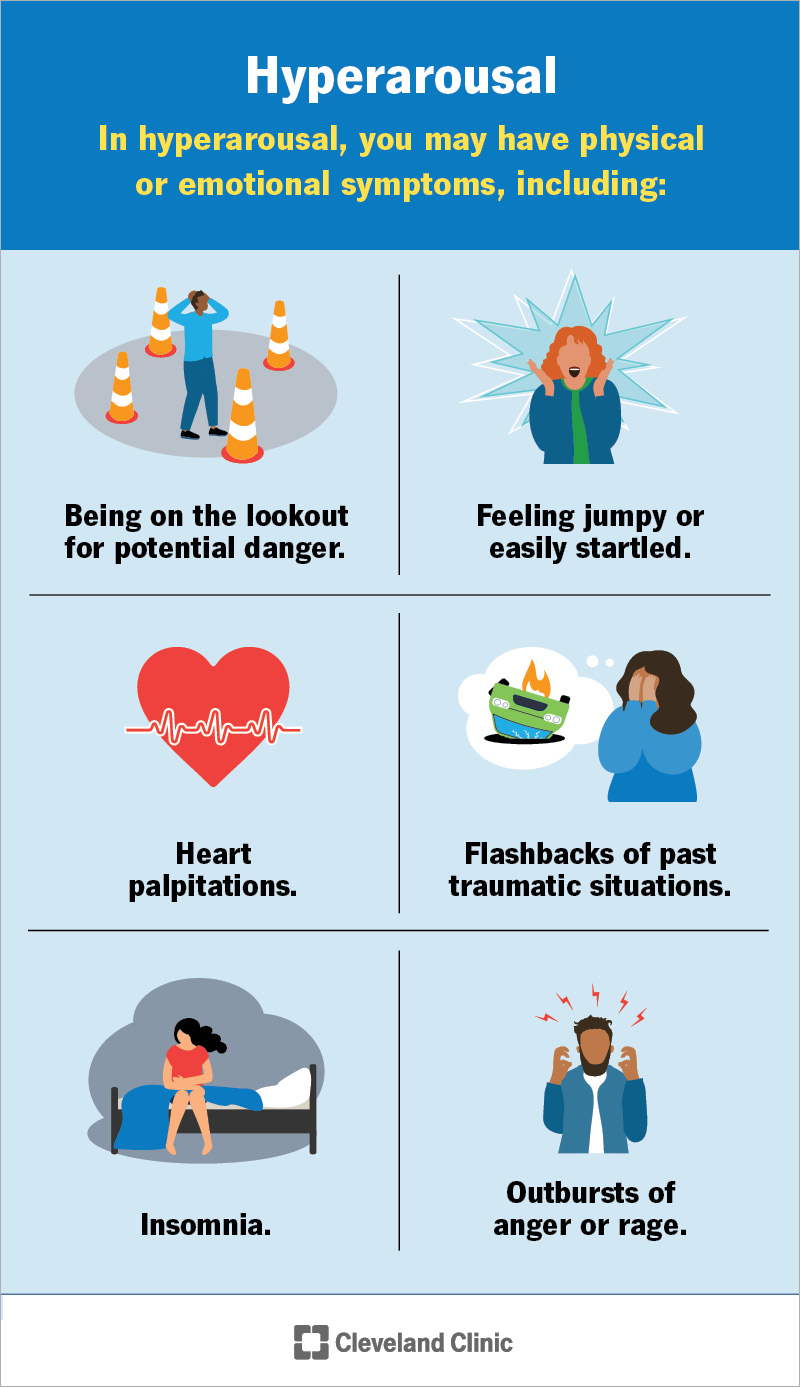Hyperarousal is a collection of symptoms that happen when your instinctive “fight-or-flight” response is too sensitive or stays active for longer than it should. Symptoms include hypervigilance, startling easily, being sensitive to sound and textures, angry outbursts and more. Treatment, including medication and stress management, can help.
Advertisement
Cleveland Clinic is a non-profit academic medical center. Advertising on our site helps support our mission. We do not endorse non-Cleveland Clinic products or services. Policy

Image content: This image is available to view online.
View image online (https://my.clevelandclinic.org/-/scassets/images/org/health/articles/hyperarousal)
Hyperarousal is a state in which your senses are heightened and your thoughts, emotions — and even some bodily processes — work overtime. It’s like being in “fight-or-flight” mode all the time, only there’s no present danger.
Advertisement
Cleveland Clinic is a non-profit academic medical center. Advertising on our site helps support our mission. We do not endorse non-Cleveland Clinic products or services. Policy
In fight-or-flight, your heart pumps harder. Your breathing gets deeper and faster. All of your body systems — from your eyes to your skin to your liver — work to help you notice and move away from danger.
Your sympathetic nervous system (SNS) controls this feeling of fight-or-flight — and it’s meant to be temporary. Your SNS releases chemicals (neurotransmitters) that send your brain and body into action. Once you’re safe, your parasympathetic nervous system helps to settle things down again.
Except in hyperarousal, you’re not usually dealing with a threat that’s right in front of you. Often, the thing you’re worried about happened a long time ago. Hyperarousal can occur as part of health conditions like post-traumatic stress disorder (PTSD) or insomnia.
In hyperarousal, you may have physical or emotional symptoms, including:
Advertisement
Conditions that affect how you regulate emotions, thoughts or actions can cause hyperarousal, including:
Certain substances like cocaine, caffeine, nicotine and alcohol can also cause hyperarousal.
As hyperarousal has many causes, treatment depends on why it’s happening in your particular situation. In many cases, treatment may be a combination of psychotherapy, stress and anxiety management techniques and medication.
Because the treatments can vary, your healthcare provider is the best source of information about possible treatments. They can help you understand your options and decide which are best for you.
Hyperarousal isn’t a symptom you can self-diagnose or self-treat. Sometimes, people with hyperarousal feel stuck or overwhelmed. If this is the case, there are some things you can do in the short term to feel better. You can even plan ahead and have some of these items on hand for events you know might be stressful, like going to a concert or moving your child to college.
Powerful sensory stimulation may help reduce feelings of hyperarousal. These include things like:
To get longer-term relief, you’ll want to develop new techniques to calm your sympathetic nervous system. If a healthcare provider diagnoses you with a condition that causes hyperarousal, they can guide you through possible approaches to manage or minimize the effects.
Some examples of common self-management strategies for hyperarousal include:
Advertisement
Hyperarousal makes it hard for you to relax. Your body is adaptable, but it wasn't meant to handle such high levels of stress for prolonged periods. Hyperarousal can contribute to chronic pain, high blood pressure, heart problems and even increase your risk for Type 2 diabetes.
Hyperarousal can also disrupt your work and social life. It can even interfere with your relationships, affecting how you respond to others. Hyperarousal may lead to outbursts or behaviors you later regret or feel ashamed of. But treatment and stress management can help.
You should always see a healthcare provider if you suspect you have hyperarousal. While similar to stress, it’s more severe, and so are its long-term effects. If your provider diagnoses it, you should see them as recommended.
If you or a loved one are having thoughts of hurting yourself or suicide, call or text the Suicide and Crisis Lifeline at 988. Someone is available to help you 24/7.
If you’re going through your day with your teeth clenched and muscles tensed in hyperarousal, your body and mind likely need a break. It can be hard to see things as they are when you’re constantly replaying old scenes in your head. And it can be hard to hear things as they are with the volume turned way up. This kind of constant stress isn’t sustainable. It’s important to see a healthcare provider to help you manage hyperarousal and the conditions that cause it.
Advertisement

Sign up for our Health Essentials emails for expert guidance on nutrition, fitness, sleep, skin care and more.
Learn more about the Health Library and our editorial process.
Cleveland Clinic’s health articles are based on evidence-backed information and review by medical professionals to ensure accuracy, reliability and up-to-date clinical standards.
Cleveland Clinic’s health articles are based on evidence-backed information and review by medical professionals to ensure accuracy, reliability and up-to-date clinical standards.
Your mental well-being is just as important as your physical well-being. Cleveland Clinic’s mental health experts can help you live life to the fullest.
